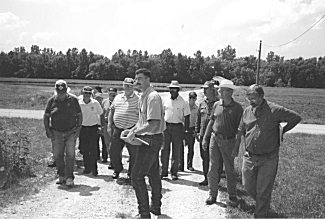
|
| Dusty Walter, training specialist with the University of Missouri Center for Agroforestry, talks with members of the Missouri Walnut Council at their summer meeting. |
Their meeting showcased walnut research being done by the University of Missouri Center for Agroforestry. One agroforestry study involves growing black walnut for quality timber using hybrid pine (pitch/loblolly) on either side of the walnut tree to serve as a "trainer tree." This triple-row planting configuration encourages upward growth of the walnut while also creating an environment that promotes the natural pruning of the lower branches of the walnut tree.
How well forage grows in the shaded alleys of this configuration is also being studied, as is the potential to produce pine straw (pine needle mulch) from the pine hybrids.
A walnut breeding program is under way at HARC that seeks to improve traits such as annual productivity, anthracnose resistance, ripening date, bud break date, percent kernel, kernel color and quality, ease of extraction, shell thickness, and nut size.
Other topics at the meeting covered included thinning walnut stands and the use of chemical treatments to ensure that removed trees do not resprout.
The fall meeting of the Missouri Walnut Council will be Oct. 27 (see Calendar on back page for details). For more information on the Walnut Council visit the Web site: http://www.walnutcouncil.org/. Or, contact Howard McCarty, 34985 Minnow Pl., Macon, MO 63552.